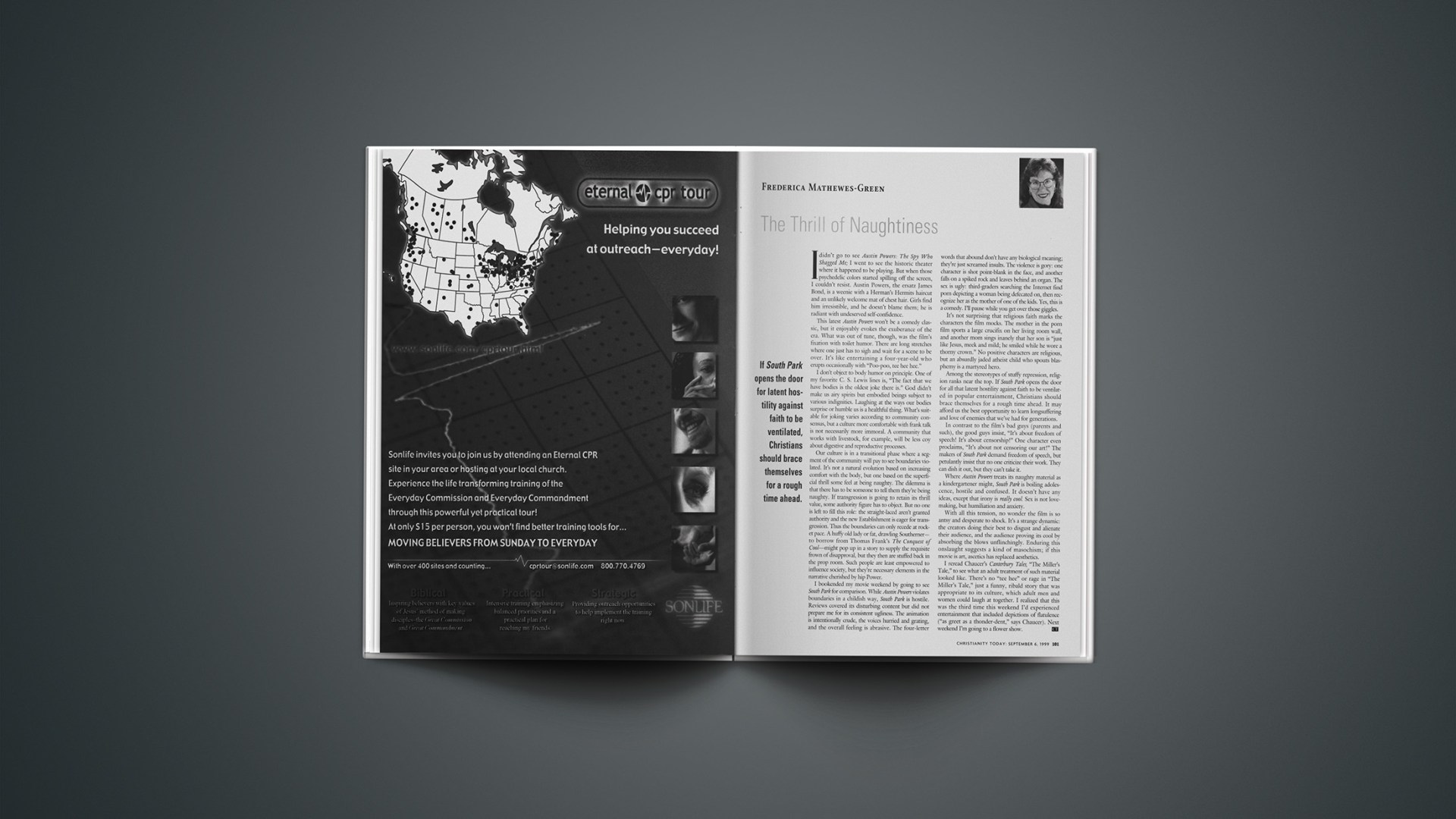I didn’t go to see Austin Powers: The Spy Who Shagged Me; I went to see the historic theater where it happened to be playing. But when those psychedelic colors started spilling off the screen, I couldn’t resist. Austin Powers, the ersatz James Bond, is a weenie with a Herman’s Hermits haircut and an unlikely welcome mat of chest hair. Girls find him irresistible, and he doesn’t blame them; he is radiant with undeserved self-confidence.
This latest Austin Powers won’t be a comedy classic, but it enjoyably evokes the exuberance of the era. What was out of tune, though, was the film’s fixation with toilet humor. There are long stretches where one just has to sigh and wait for a scene to be over. It’s like entertaining a four-year-old who erupts occasionally with “Poo-poo, tee hee hee.”
I don’t object to body humor on principle. One of my favorite C. S. Lewis lines is, “The fact that we have bodies is the oldest joke there is.” God didn’t make us airy spirits but embodied beings subject to various indignities. Laughing at the ways our bodies surprise or humble us is a healthful thing. What’s suitable for joking varies according to community consensus, but a culture more comfortable with frank talk is not necessarily more immoral. A community that works with livestock, for example, will be less coy about digestive and reproductive processes.
Our culture is in a transitional phase where a segment of the community will pay to see boundaries violated. It’s not a natural evolution based on increasing comfort with the body, but one based on the superficial thrill some feel at being naughty. The dilemma is that there has to be someone to tell them they’re being naughty. If transgression is going to retain its thrill value, some authority figure has to object. But no one is left to fill this role: the straight-laced aren’t granted authority and the new Establishment is eager for transgression. Thus the boundaries can only recede at rocket pace. A huffy old lady or fat, drawling Southerner—to borrow from Thomas Frank’s The Conquest of Cool—might pop up in a story to supply the requisite frown of disapproval, but they then are stuffed back in the prop room. Such people are least empowered to influence society, but they’re necessary elements in the narrative cherished by hip Power.
I bookended my movie weekend by going to see South Park for comparison. While Austin Powers violates boundaries in a childish way, South Park is hostile. Reviews covered its disturbing content but did not prepare me for its consistent ugliness. The animation is intentionally crude, the voices hurried and grating, and the overall feeling is abrasive. The four-letter words that abound don’t have any biological meaning; they’re just screamed insults. The violence is gory: one character is shot point-blank in the face, and another falls on a spiked rock and leaves behind an organ. The sex is ugly: third-graders searching the Internet find porn depicting a woman being defecated on, then recognize her as the mother of one of the kids. Yes, this is a comedy. I’ll pause while you get over those giggles.
It’s not surprising that religious faith marks the characters the film mocks. The mother in the porn film sports a large crucifix on her living room wall, and another mom sings inanely that her son is “just like Jesus, meek and mild; he smiled while he wore a thorny crown.” No positive characters are religious, but an absurdly jaded atheist child who spouts blasphemy is a martyred hero.
Among the stereotypes of stuffy repression, religion ranks near the top. If South Park opens the door for all that latent hostility against faith to be ventilated in popular entertainment, Christians should brace themselves for a rough time ahead. It may afford us the best opportunity to learn longsuffering and love of enemies that we’ve had for generations.
In contrast to the film’s bad guys (parents and such), the good guys insist, “It’s about freedom of speech! It’s about censorship!” One character even proclaims, “It’s about not censoring our art!” The makers of South Park demand freedom of speech, but petulantly insist that no one criticize their work. They can dish it out, but they can’t take it.
Where Austin Powers treats its naughty material as a kindergartener might, South Park is boiling adolescence, hostile and confused. It doesn’t have any ideas, except that irony is really cool. Sex is not lovemaking, but humiliation and anxiety.
With all this tension, no wonder the film is so antsy and desperate to shock. It’s a strange dynamic: the creators doing their best to disgust and alienate their audience, and the audience proving its cool by absorbing the blows unflinchingly. Enduring this onslaught suggests a kind of masochism; if this movie is art, ascetics has replaced aesthetics.
I reread Chaucer’s Canterbury Tales, “The Miller’s Tale,” to see what an adult treatment of such material looked like. There’s no “tee hee” or rage in “The Miller’s Tale,” just a funny, ribald story that was appropriate to its culture, which adult men and women could laugh at together. I realized that this was the third time this weekend I’d experienced entertainment that included depictions of flatulence (“as greet as a thonder-dent,” says Chaucer). Next weekend I’m going to a flower show.
Copyright © 1999 Christianity Today. Click for reprint information.










